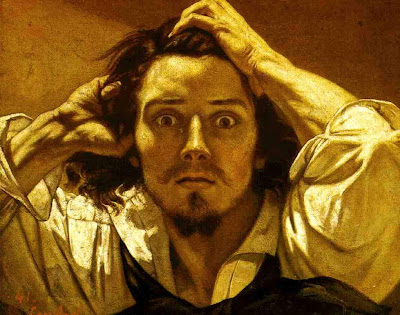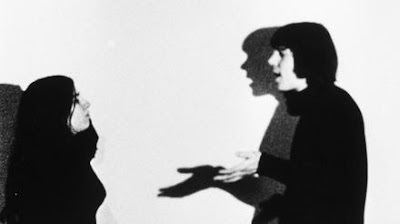

Cine Experimental




 Es importante valorar esta atrevida y provocadora película desde el contexto histórico en el que se realiza. Es 1970 con una sociedad norteamericana metida en una guerra que no eligió, gracias a eso surgen grupos que se oponen a luchar, grupos pacifistas y con ideales comunistas.
Es importante valorar esta atrevida y provocadora película desde el contexto histórico en el que se realiza. Es 1970 con una sociedad norteamericana metida en una guerra que no eligió, gracias a eso surgen grupos que se oponen a luchar, grupos pacifistas y con ideales comunistas.

I wanted to do something -to put it as sentimentally as possible-for James Clerk
Maxwell who is, or was, either the last qualitative physicist or the first quan- titative physicist . Maxwell is known and admired among physicists for his work in thermodynamics, which is something I don't know or understand very much about. I believe we're all steeped in thermodynamics in the physical sense ; but I have particularly revered Clerk Maxwell because he became, in a very brief aside in
a lecture delivered at the Royal College of Edinburgh or some place like that, the Father of the Analytical theory of color, which,in it's applications and ramifications, has given us color photography and color cinematography. Hollis Frampton.

Me parece interesante que Frampton lleva un pensamiento-experimento de la segunda ley de la Termodinámica a un filme. Cuando vi Maxwells Demon no logré entender muy bien la relación entre lo que explica Frampton en su entrevista con Robert Gardner sobre la Termodinámica, pero ahora que investigo más sobre el tema, me gustaría verlo de nuevo con una idea mas clara. Aun así me pareció interesante el movimiento de ese individuo que parece estar haciendo calentamientos, el sonido que establece un ritmo junto con la imagen pero no necesariamente en sincronía.
El siguiente video ayuda a entender lo que es Maxwell`s Demon.
 En este filme experimenté algo distinto que en los demás trabajos de Stan Brakhage, en ningún momento me preocupó saber con que técnica se realizó. Fue un viaje visual corto en su tiempo pero largo en su intensidad, mucho movimiento, mucho ritmo, colores, formas. Es como un collage en el que la interpretación queda fuera dejando al ojo pasar libremente la señal hacia a mente del espectador.
En este filme experimenté algo distinto que en los demás trabajos de Stan Brakhage, en ningún momento me preocupó saber con que técnica se realizó. Fue un viaje visual corto en su tiempo pero largo en su intensidad, mucho movimiento, mucho ritmo, colores, formas. Es como un collage en el que la interpretación queda fuera dejando al ojo pasar libremente la señal hacia a mente del espectador. Me interesa hablar del personaje de Jerry, quien representa a los que no encajan en una sociedad, mas bien en la una sociedad determinada en un lugar y un tiempo en el que cuando las personas intentan salir o salen por falta de recursos de las conductas determinadas como "normales" o "aceptadas" se les hace a un lado. Para mi pesa mas Jerry que Jack quien sería un tipo de contraparte ya que es el que vive la vida.
Me interesa hablar del personaje de Jerry, quien representa a los que no encajan en una sociedad, mas bien en la una sociedad determinada en un lugar y un tiempo en el que cuando las personas intentan salir o salen por falta de recursos de las conductas determinadas como "normales" o "aceptadas" se les hace a un lado. Para mi pesa mas Jerry que Jack quien sería un tipo de contraparte ya que es el que vive la vida.
GZ: Whereas you were hoping an indeterminate cinema, an explosion of cinematic images presented to the viewer, would allow the viewer through reflection and interpretation to take an active role in the aesthetic experience, you see that this idea of indeterminacy is being used to reify viewers.
KJ: Ironically, when I first got started making films, in a vague sense this is what I hoped for – a cinema by which, through interpretation and reflection, the viewer could constitute his or her own aesthetic experience. Yet, experiences like the one manufactured by this game have no place for interpretative or reflective capacities of the human mind. They merely give the illusion of choice, while turning people into automatons. It lends no real freedom to the viewer, or in this case, player. Here it’s just training and triggering in violence. It’s just a matter of choosing who to kill. You are taken deeper and deeper into this fake reality, which gives you a false sense that you are making decisions. In a sense, games like this one are just continuing a trend amongst many films. I hoped that an indeterminate cinema would force the viewer to actively reflect on what they saw on the screen and not just be a passive receiver of images, but make decisions and judgments. I want to give the viewer as much freedom as possible to reflect on what they have seen.



 Hay momentos en el que extrañé mucho el sonido y la musicalización, primero en el camino a la Zona porque parte de ese recorrido que te transporta a otro lugar, es como un limpiador de mente en el que el sonido te aparta de la realidad pero siempre usando elementos sonoros incidentales. Otro momento en el que estuve a punto de quitar el "mute" fue cuando la hija del stalker mueve los vasos en la mesa, recordaba tan bien el fondo musical y el sonido de los vasos moviendose, que por un momento lo escuche, pero el volumen era muy bajo y disperso.
Hay momentos en el que extrañé mucho el sonido y la musicalización, primero en el camino a la Zona porque parte de ese recorrido que te transporta a otro lugar, es como un limpiador de mente en el que el sonido te aparta de la realidad pero siempre usando elementos sonoros incidentales. Otro momento en el que estuve a punto de quitar el "mute" fue cuando la hija del stalker mueve los vasos en la mesa, recordaba tan bien el fondo musical y el sonido de los vasos moviendose, que por un momento lo escuche, pero el volumen era muy bajo y disperso. 




Artificial light
1 . A, upside-down and backwards
2 . A, in negative
3 . A, with superimposition of sprocket holes
4 . A, with eyes painted blue and mouths red
5 . A, scarred with a white drip mark
6 . A, covered with transparent stripes of red and green
7 . Still shots in sequence from A; a stroboscopic or flicker effect
8 . A, almost obliterated by scratches
9 . Shots from A, toned different colors by dye, in an asequential order
10 . A, with faces and hair outlined by scratches, dissolves marked with a scratched slash (/)
11 . A, spotted with multicolor drops
12 . Superimposition of A, with a copy of A in which left and right are reversed
13 . A, with all faces bleached out
14 . A, with a flicker of colors (red, green, blue)
15 . A, covered with art-type printers dots
16 . A, toned sepia
17. A, superimposed over itself with a lag of one-and-a-half-seconds
18 . A, interrupted by two-frame flashes of color negative
19 . A, colored, as if through an electrical process, in a series of two primaries
20 . A, with a closeup of a moon crater substituted for the expected moon shots





